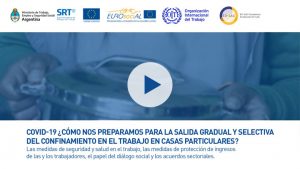Search Filters
May 20, 2021 | 12:00 pm Argentina - 5:00 pm Bélgica
The Argentinian Ministry of Health, together with the European Union’s EUROsociAL+ programme, are promoting the formulation of a national standard that provides general operating conditions for residences for the elderly with a human rights perspective. The definition of this standard is proposed as a process of federal construction and inter-institutional coordination.To this end, this workshop has been organised in which international social and health public policy experiences that respond to situations of dependency, especially with regard to long-term services, will be presented. In this regard, the presentation of the European expert Lourdes Bermejo is valuable, given her background in this field. The construction of the regulatory framework for residences for the elderly in Uruguay as a component of the progressive care system and the role of the Ministry of Health in coordination with the First Level of Care will also be analysed. To comment on the main achievements and challenges, we will be joined by two representatives from the country.Meanwhile, given that the Argentine Ministry of Women, Gender and Diversity is working on the legislative design of a national care system, it is appropriate to know more about the section dedicated to the elderly. We therefore invited Lucia Cirmi, National Director of Care at the Ministry of Women, Gender and Diversity to take part.This workshop is aimed at national and provincial officials from the ministries of health, social development and other significant areas of our country, with competence and interest in the subject of older people.
November 9, 2020 | 9:00 am Montevideo - 1:00 pm Madrid
The EU EUROSociAL+ Programme participated in the virtual laboratory “Public finance for development – public income in the context of COVID-19”, organised by the Spanish Cooperation Training Centre in Montevideo, which had contributions from other institutions and international organisations such as the IDB, CIAT, ECLAC, IEF, OECD, Red Sur and AECID. The Democratic Governance Area of the EU EUROSOCiAL+ Programme was in charge of a module that emphasised Euro-Latin American dialogue on fiscal policies.
This exchange aims to promote reflection on the situation of public revenues in the current context of economic and social crisis generated by COVID-19 and share solutions through taxation to improve collection and encourage the recovery of the economic fabric. At the same time, work was carried out on the definition and joint design of an action programme in Public Finance for Development with a regional vocation, aligned with the new needs posed by the pandemic and which contributes to fiscal sustainability with equity.
July 14, 2020 | 11:00 am Buenos Aires y Montevideo - 4:00 pm Bruselas
Measures to prevent the spread of Covid-19 have drawn attention to the value of paid and unpaid domestic work, mostly carried out by women. The Covid-19 crisis reveals the vulnerability of paid domestic workers, especially with regard to the risks of contagion from the disease, given that their workplace (a home) is indoors and their tasks involve interaction with the members of the home they serve.
This webinar is part of a cycle of four dedicated to the exchange of knowledge and experiences on the measures that are being adopted in the countries of the Southern Cone to preserve health and safety conditions in the gradual return to workplaces in four specific areas: construction, public transport, and work in private homes and in markets.
This activity is co-organised by the Ministry of Labour, Employment, and Social Security of Argentina, the Superintendency of Occupational Risks of Argentina, the Office of the International Labour Organization Southern Cone, the EU-LAC Foundation, and by the area of Social Policies of the European Union programme EUROsociAL+.
June 30, 2020 | 11:00 am Buenos Aires y Montevideo - 10:00 am Santiago de chile
In some countries, measures are being taken and sectoral protocols are being adopted for the progressive resumption of activity after the lockdown caused by the coronavirus. From the point of view of safety and health at work, governments have established protection and prevention measures aimed at minimising the occupational risks derived from the gradual and progressive return to work. This webinar focuses on safety and health measures for the care of workers in the sector and care measures for the workforce that, in general, uses public transportation to get to work.
This webinar is part of a cycle of three dedicated to the exchange of knowledge and experiences on the sectoral agreements that are being adopted in the countries of the Southern Cone to preserve health and safety conditions in the gradual return to workplaces in three specific areas: construction, public transport, and work in private homes.
This activity is co-organised by the Ministry of Labour, Employment, and Social Security of Argentina, the Superintendency of Occupational Risks of Argentina, the Office of the International Labour Organization Southern Cone, and by the Social Policies area of the European Union programme EUROsociAL+.
Link to video of webinar
| -
The persistence of violence against women requires investments in ambitious, innovative and sustainable actions to protect female victims of violence. The EUROsociAL+ Programme has joined the commitment, supporting the implementation of the New National Plan for a life free of gender violence in Uruguay, from a line of work based on intervention with male aggressors to prevent recidivism and foster their re-socialisation.
Within this framework, the international seminar “Challenges and proposals for intervention with men who exercise gender-based violence” will take place on 9 December, organised by the National Institute of Women of Uruguay (InMujeres-MIDES), with support from the Uruguayan Agency for International Cooperation (AUCI), and the EUROsociAL+ Programme.
The event was opened by the director of InMujeres, Mónica Bottero, and cooperation representatives Claudia Romano for the AUCI, and Markus Handke for the Delegation of the European Union in Uruguay.
Three experts will present the good practices and lessons learned from various intervention programmes with men who commit violent acts against their partners
| -
The “Entramadas” Project We confront inequalities and violence, researching, strengthening capacities and connecting local resources (2021 – 2023), financed by the European Union, invites dialogue on the “Process of building information on femicide in Uruguay in dialogue with the experience of the Gender Violence Observatory of the Spanish Judiciary”
Authorities:
Mónica Bottero – Director of the National Women’s Institute of Uruguay
Representative of the European Union Delegation in Uruguay
Leticia Benedet – Expert for the Area of Gender Equality Policies – EUROsociAL Regional Programme – European Union
Carmen Beramendi – Director of Flacso Uruguay
Speakers:
Sofía Cardozo – Author of the Report: Diagnosis of institutional responses to Gender-Based Violence in Uruguay
Natalia Reyes – Responsible for the Gender Information System (SIG) National Women’s Institute
María Ángeles Carmona Vergara – President of the Observatory against domestic and gender violence of the General Council of the Judiciary of Spain Jesús Gallego – Head of Section of the Observatory against domestic and gender violence of the General Council of the Judiciary of Spain
Chair:
Silvana Darré – Flacso Uruguay – “Entramadas” project
Location: National Institution of Human Rights and Ombudsman’s Office – Av. Bvr. Artigas 1532
Date: Tuesday, 29 March
Schedule: 9 – 12 hours
Live streaming


